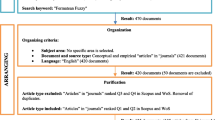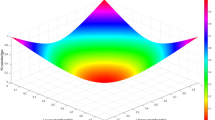Abstract
Since the World Wide Web Consortium (W3C) recommended the Resource Description Framework (RDF) data model, it has been widely adopted and applied in the era of Big Data and knowledge engineering. Now, large volumes of RDF data are produced and made available regularly. In real-world applications, information is often vague or ambiguous. Therefore, data may contain imperfect information, particularly in the context of open information extraction from the Web. The fuzzy RDF model has been proposed to handle uncertain semantics in RDF data. Aggregate functions are a group of functions for statistics and group data calculation, which are essential for the analysis and processing of RDF data. In spite of the increased attention given to aggregate queries over RDF data, little has been done on aggregate queries over fuzzy RDF data. This paper proposes a more scalable and flexible aggregate query method for fuzzy RDF data. By introducing the concepts of upper and lower bounds and expectation in probability theory, we identify three variants of the aggregate functions in RDF query language over the fuzzy RDF model. The language has been implemented by transformation based on standard SPARQL language and evaluated with experiments. In addition, we examine how to handle multiple types of aggregate operations.








Similar content being viewed by others
Data availability
Available on request.
References
Klyne G, Carroll JJ Resource description framework (RDF): Concepts and Abstract Syntax. http://www.w3.org/TR/2004/REC-rdf-concepts-20040210/
Bornea MA et al. (2013) Building an efficient RDF store over a relational database. In: Proceedings of the 2013 ACM International Conference on Management of Data, 121–132
Ji S et al (2020) A survey on knowledge graphs: representation, acquisition and applications. IEEE Trans Neural Netw Learn Syst 33(2):494–514
Manolis N, Tzitzikas Y (2011) Interactive exploration of fuzzy RDF knowledge bases. In: Proceedings of the 8th Extended Semantic Web Conference. 1–16
Raju KVSVN, Majumdar AK (1988) Fuzzy functional dependencies and lossless join decomposition of fuzzy relational database systems. ACM Trans Database Syst 13(2):129–166
Majumdar AK, Bhattacharya I, Saha AK (2002) An object-oriented fuzzy data model for similarity detection in image databases. IEEE Trans Knowl Data Eng 14(5):1186–1189
Panic G, Rackovic M, Skrbic S (2014) Fuzzy XML and prioritized fuzzy XQuery with implementation. J Intell Fuzzy Syst 26(1):303–316
Lisi FA, Straccia U (2015) Learning in description logics with fuzzy concrete domains. Fund Inform 140(3–4):373–391
Morente-Molinera JA, Pérez IJ, Ureña MR, Herrera-Viedma E (2015) Building and managing fuzzy ontologies with heterogeneous linguistic information. Knowl-Based Syst 88:154–164
Ma ZM, Li Y (2008) A literature overview of fuzzy database models. J Inf Sci Eng 24(1):189–202
Ma ZM, Li Y (2010) A literature overview of fuzzy conceptual data modeling. J Inf Sci Eng 26(2):427–441
Ma Z, Yan Li (2016) Modeling fuzzy data with XML: a survey. Fuzzy Sets Syst 301:146–159
Mazzieri M, Dragoni AF (2008) A fuzzy semantics for the resource description framework. URSW 2005–2007:244–261
Lv YH, Ma ZM, Yan L (2008) Fuzzy RDF: a data model to represent fuzzy metadata. In: Proceedings of the 2008 IEEE International Conference on Fuzzy Systems. Hong Kong, China, 1439–1445
Ma Z, Li G, Yan Li (2018) Fuzzy data modeling and algebraic operations in RDF. Fuzzy Sets Syst 351:41–63
Vaneková V, Bella J, Gurský P, Horváth T (2005) Fuzzy RDF in the semantic web: deduction and induction. In: Proceedings of the 6th Workshop on Data Analysis, Abaujszanto, 16–29
Straccia U (2009) A minimal deductive system for general fuzzy RDF. In: Proceedings of the 3th International Conference on Web Reasoning and Rule Systems, Chantilly, USA, 166–181
Liu C, Qi GL, Wang HF, Yu Y (2011) Fuzzy reasoning over RDF data using OWL vocabulary. In: Proceedings of the 2011 IEEE/WIC/ACM International Conference on Web Intelligences, 162–169
Buche P, Dibie-Barthélemy J, Hignette G (2008) Flexible querying of fuzzy RDF annotations using fuzzy conceptual graphs. In: Proceedings of the 16th International Conference on Conceptual Structures, 133–146
Bahri A, Bouaziz R, Gargouri F (2010) Querying fuzzy RDFS semantic annotations. In: Proceedings of the 2010 IEEE International Conference on Fuzzy Systems, 1–8
Pivert O, Slama O, Thion V (2016) An extension of SPARQL with fuzzy navigational capabilities for querying fuzzy RDF data. In: Proceedings of the 2016 IEEE International Conference on Fuzzy Systems, 2409–2416
Pivert O, Slama O, Thion V (2017) Fuzzy quantified queries to fuzzy RDF databases. In: Proceedings of the 2017 IEEE International Conference on Fuzzy Systems, 2017
Slama O(2019) Personalized queries under a generalized user profile model based on fuzzy SPARQL preferences. In: 2019 IEEE International Conference on Fuzzy Systems (FUZZ-IEEE), 2019: 1–6
Li G, Yan Li, Ma Z (2019) Pattern match query over fuzzy RDF graph. Knowl-Based Syst 165:460–473
Li G, Yan Li, Ma Z (2019) A method for fuzzy quantified querying over fuzzy resource description framework graph. Int J Intell Syst 34(6):1086–1107
Li G, Yan Li, Ma Z (2019) An approach for approximate subgraph matching in fuzzy RDF graph. Fuzzy Sets Syst 376:106–126
Li G, Ma Z (2018) An efficient matching algorithm for fuzzy RDF graph. J Inf Sci Eng 34(2):519–534
Ma Z, Yan Li (2018) Modeling fuzzy data with RDF and fuzzy relational database models. Int J Intell Syst 33(7):1534–1554
Fan T, Yan Li, Ma Z (2019) Mapping fuzzy RDF(S) into fuzzy object-oriented databases. Int J Intell Syst 34(10):2607–2632
Fan T, Yan Li, Ma Z (2020) Storing and querying fuzzy RDF(S) in HBase databases. Int J Intell Syst 35(4):751–780
Jugel U, Jerzak Z, Hackenbroich G, Markl V (2016) VDDA: automatic visualization-driven data aggregation in relational databases. VLDB J 25(1):53–77
Chan CY et al. (2002) Tree pattern aggregation for scalable XML data dissemination. In: Proceedings of 28th International Conference on Very Large Data Bases, 826–837
Wu H, Ling TW, Xu L, Bao Z (2009) Performing grouping and aggregate functions in XML queries. In: Proceedings of the 18th International Conference on World Wide Web, 1001–1010
Kaminski M, Kostylev EV, Grau BC (2017) Query nesting, assignment, and aggregation in SPARQL 1.1. ACM Trans Database Syst 42(3):1–46
McClean SI, Scotney BW, Shapcott M (2001) Aggregation of imprecise and uncertain information in databases. IEEE Trans Knowl Data Eng 13(6):902–912
Scotney BW, McClean SI (2003) Database aggregation of imprecise and uncertain evidence. Inf Sci 155(3–4):245–263
Murthy R, Ikeda R, Widom J (2011) Making aggregation work in uncertain and probabilistic databases. IEEE Trans Knowl Data Eng 23(8):1261–1273
Pivert O, Prade H (2014) Dealing with aggregate queries in an uncertain database model based on possibilistic certainty. IPMU 3(2014):150–159
Nermin Abdel-Hakim Othman, Eldin AS, El Zanfaly DS (2015) Enhancing aggregation over uncertain databases. In: 2015 IEEE International Conference on Computer and Information Technology; Ubiquitous Computing and Communications; Dependable, Autonomic and Secure Computing; Pervasive Intelligence and Computing, 132–139
Damiani E, Tanca L, Fontana FA (2000) Fuzzy XML queries via context-based choice of aggregations. Kybernetika 36(6):635–655
Abiteboul S et al. (2010) Aggregate queries for discrete and continuous probabilistic XML. In: Proceedings of the 13th International Conference on Database Theory, 50–61
Abiteboul S et al (2011) Capturing continuous data and answering aggregate queries in probabilistic XML. ACM Trans Database Syst 36(4):1–45
Almendros-Jiménez JM, Becerra-Terón A, Moreno G (2017) A fuzzy extension of SPARQL based on fuzzy sets and aggregators. In: Proceedings of the 2017 IEEE International Conference on Fuzzy Systems, pp. 1–6
Beckett D, RDF/XML Syntax Specification, http://www.w3.org/TR/2004/REC-rdf-syntax-grammar-20040210/
Zadeh LA (1965) Fuzzy sets. Inf Control 8(3):338–353
Zadeh LA (1978) Fuzzy sets as a basis for a theory of possibility. Fuzzy Sets Syst 1(1):3–28
Siddique N, Adeli H (2013) Computational intelligence synergies of fuzzy logic neural networks and evolutionary computing. Wiley, West Sussex
Sheldon R (2002) A first course in probability. Pearson Education India, New Delhi
Acknowledgements
The work is supported in part by the National Science Foundation of China (62176121 and 61772269).
Funding
The work is supported in part by the National Science Foundation of China (62176121 and 61772269).
Author information
Authors and Affiliations
Contributions
ZM wrote the main manuscript text; XZ and YZ prepared experiments. All authors reviewed the manuscript.
Corresponding author
Ethics declarations
Conflict of interests
The authors declare that they have no known competing financial interests or personal relationships that could have appeared to influence the work reported in this paper.
Consent for publication
All authors reviewed the manuscript and consent for publication.
Additional information
Publisher's Note
Springer Nature remains neutral with regard to jurisdictional claims in published maps and institutional affiliations.
Rights and permissions
Springer Nature or its licensor (e.g. a society or other partner) holds exclusive rights to this article under a publishing agreement with the author(s) or other rightsholder(s); author self-archiving of the accepted manuscript version of this article is solely governed by the terms of such publishing agreement and applicable law.
About this article
Cite this article
Ma, Z., Zhang, X. & Zhao, Y. Queries with aggregate functions over fuzzy RDF data. J Supercomput 79, 14780–14807 (2023). https://doi.org/10.1007/s11227-023-05235-x
Accepted:
Published:
Issue Date:
DOI: https://doi.org/10.1007/s11227-023-05235-x




